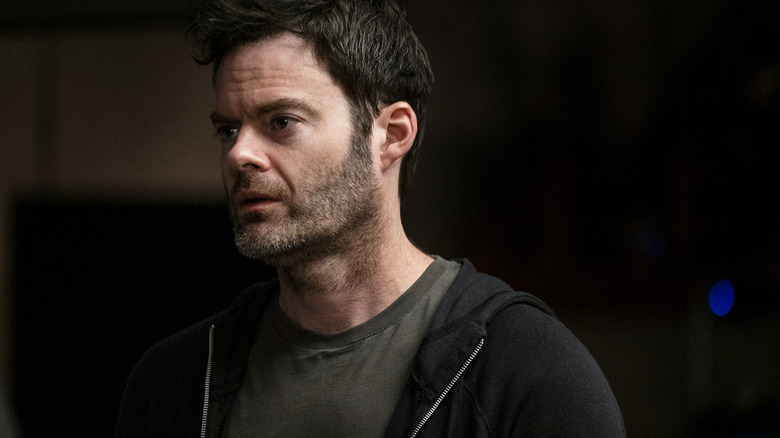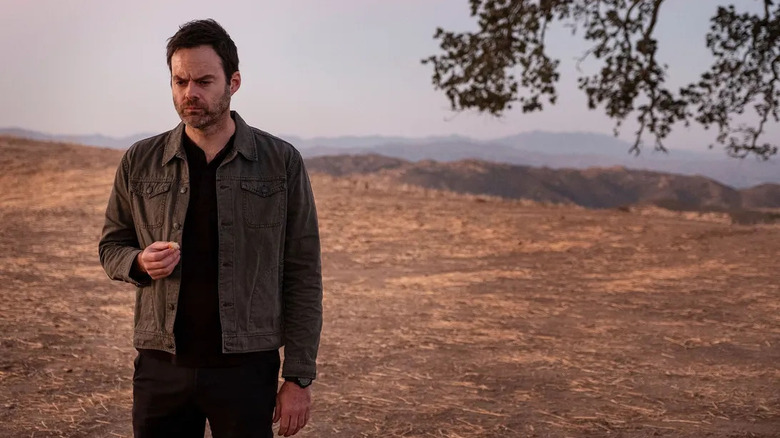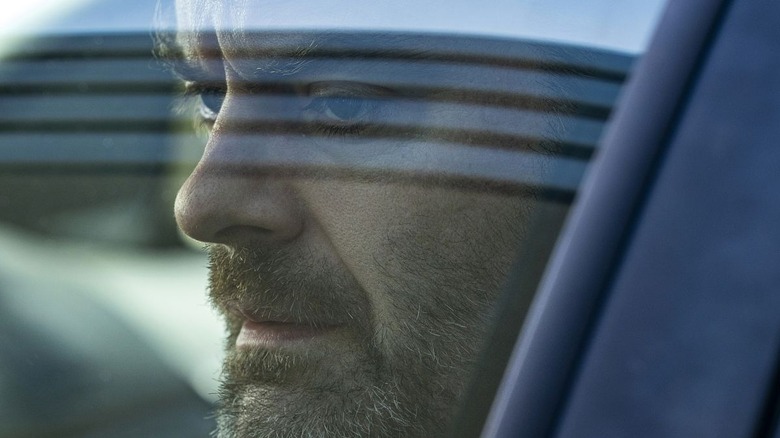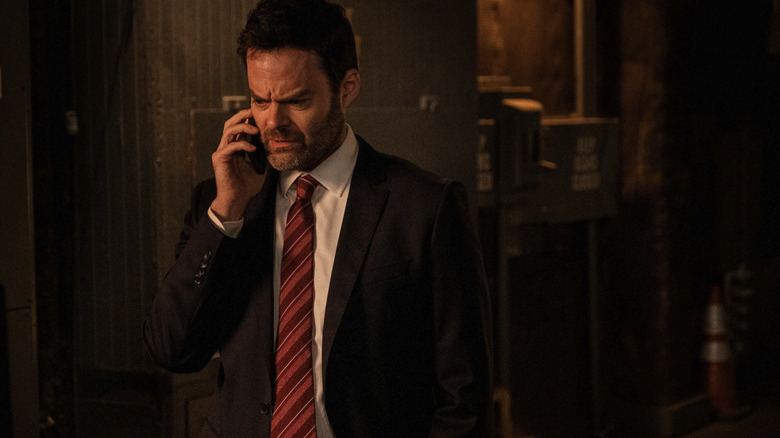Barry Season 3 Cinematographer Carl Herse Talks About Leaning Into Darkness [Interview]
Cinematographer Carl Herse knows how to make comedy cinematic. This year alone, the director of photography has shown a versatility in two of the most visually appealing TV comedies in recent memory, "The Afterparty" and season 3 of "Barry." Prior to both shows, Herse shot episodes of "Black Monday," "Nathan For You," and "The Last Man on Earth."
The cinematographer joined Alec Berg and Bill Hader's acclaimed HBO series in 2019, but shutdown happened the day after the first table read. As a result, Herse spent years with the scripts. "Throughout Covid, we spent a lot of time talking, sharing movies," Herse explained. "Bill's a huge film fanatic. It's just a lot of nerding out together about what we liked and didn't like, and I think all that eventually weaves its way organically into what we're doing."
Recently, in part one of a two-part interview, Herse told us about his collaboration with Berg and Hader, the one and only lens used on "Barry," and how the Coen Brothers influenced the style of the show. Stay tuned for the second part of our conversation later in the season.
'It's not a normal TV situation'
This season is about consequences. Visually, how did the themes of season 3 influence the aesthetic choices? The darkness is noticeably more present.
I think with the lensing of it, you have to tell the story honestly. I think the show's always had this, but I wanted to lean in this season to that imperturbable perspective that is largely objective and the camera's the blind justice. You're dealing with all these morally complicated characters and you want a way of shooting them that doesn't pass judgment on them. Also, it just shows you, this is happening. We would try to create sequences, Bill and I, where you'd start with a more objective, fly-on-the-wall perspective, and then over the course of the sequence or the shot, you're moving in more and more until you're in a character's head.
I think in the first episode, there are a couple good moments that occur back to back with Sally, Natalie, and Lindsay in the hallway. They're talking about Sally's show and it starts as this objective wide shot with the camera deep down a hallway. By the end of the shot, we're so tight on Natalie and we realize the scene is about the new relationship between Natalie and Sally and Sally not treating her like the peer that they were in previous seasons. And so, you've got this drive into a character where you take something objective and make it subjective.
The next shot with Sally is similar, where we see her in this giant, vast sound stage and how small she is and that she's a part of this giant mechanism of a film set. As we move through the sequence, we're pushing in on her as people are mobbing her and you get this sense of the pressure that she's feeling, the responsibility that she has and that she is probably going to crack at some point, because it's just so much. She's finally getting what she's always wanted, but the reality is that it's challenging.
I think in terms of the darkness of the show, it's about setting yourself up with the design of the sets and the locations, and the great thing about shooting this series with Bill and Alec is that they're writing it — they're the showrunners. It's not a normal TV situation where you have a revolving door of directors coming through. You've got two filmmakers, and we're treating the whole thing like a big feature.
There are times where Bill and I can sit down and say, "Well, what's this scene about?" And then we can go to the production designer and say, "We want the space set up in a specific way." There are moments where we can lean into darkness, too. I know the original opening of the season was going to be a day scene and pretty early on, I pitched to Bill that we could do it as a dawn scene and find Barry — I really wanted to show Barry in his depth. I think Bill connected with that concept of starting in a dark, surreal environment and having the sun come up on this new version of Barry and show the audience where he is now.
It's exciting to work with a filmmaker willing to take on that challenge, especially when they're acting in the scene. Obviously, people have been waiting for the return of the show and Bill was totally willing to say, "Let's do it, we'll shoot the whole thing in an hour." We went ahead and mapped everything out. We got there the day before and lined everything up with the director's finder. We put marks in the ground where the camera positions would be.
I went out there several times at three in the morning and watched the sun come up to see where the light hit the trees and at what time. On the day that we shot it, we had our six shots. We left certain cameras in position so that we could return to those setups. There's a big wide shot of the tree that you see originally before the sun comes up and then the scene takes place and then we cut back to now, the sun has risen as Barry's walking back to his car. We shot it in chronological order so that you felt it getting brighter as we worked our way through the scene.
'A lot of our references are Coen Brothers movies'
How did you want to shoot Barry himself throughout the series? Bill Hader is a big guy, and he continues to be more imposing this season.
Definitely, and it's very funny because he is tall and I am short, so we're always looking through viewfinders at different heights. I'm always on my tiptoes or he is crouching down to my level. A part of that neutral perspective, you want the camera to be flat to the environment. When you're in that flat perspective, tall people look big and shorter people look short because that's where the lens height tends to be. We shoot, pretty much, the entire show on a single lens that we both really love.
A lot of our references are Coen Brothers movies. They are movies that try to ride that line of tragedy and comedy and find a way to visually take you from a moment of completely abysmal tragic situations into a moment that makes you laugh. We found that the 27 millimeter focal length was the one that was in the sweet spot of, everything feels a little bit exaggerated. The perspective has warped a little bit. We both like being on the slightly wider end of the lens without being too in your face about it. We almost never took the 27 off the camera, and it became a running joke on set about, like, "Yeah, we'll be on the 27, Bill, yet again."
Is that unconventional for you? Do you typically stick with one lens?
Usually on TV shows, because of the scheduling and just by design, there's the need to shoot really fast. Often when you're working with directors who are directing for showrunners, they want to protect as much as they can in the edit as possible, so you shoot a wide, you shoot a medium, you shoot a close-up, you shoot a two-shot, you shoot a three-shot, you shoot a mini.
You get all this coverage basically, that can be edited in a million different ways. I think something that's interesting with "Barry” is that Bill has a very specific way he wants to withhold or offer information to the viewer and shoots what he needs. He even goes so far as to cut when he's done with the part of the shot, knowing that he won't use it in a different part of the scene.
Normally you run an entire scene in every setup so that any part of the scene can be used in the edit, but Bill will literally shoot the wide shot for the first two lines of dialogue and then cut. And then we go in for close-ups or whatever. And so, because of that and we only shot single camera, primarily, we didn't have to compromise by using a long lens with a wide lens next to it or anything. We would shoot almost exclusively with a single camera. We could go in closer to our subject for a medium shot or a close-up after shooting the wide. It allowed us to stay on one lens.
Something about that lens felt like the world of "Barry." Everything felt a little bit strange and the world felt a little bit surreal. Especially, as you get to the midpoint in season 2, you realize that this universe has its own rules, a little bit. I think that lensing helps express that.
'There's so much intention behind every shot'
So when you see how an episode is cut together, especially those long and patient shots, are you not too surprised?
Yeah. It's pretty amazing how, from what you read on the page, through the discussion with Bill and Alec about what we're going to shoot and how we're going to shoot it, when you see the final episode is absolutely a blast, but it's also as we intended. It is really unique and cool, and it also makes for a very efficient day on set because we move quickly. We don't shoot what we don't need. We get exactly what we do need and everyone on set appreciates it.
You can also be smart with your budget, because you know you can shoot a one wall set or a two wall set and you don't need to build an entire room because you know you're not going to need that reverse shot or whatever. Alec and Bill are both such strong filmmakers that you can see that in the final product. Bill's willingness to forgo standard coverage is very refreshing to me. It feels more like a film than a TV show.
I think when you see the final edit and you see these sequences, there's so much intention behind every shot. I think that there's so many people who try to do oners in TV shows now, but the one that we did in [season 3] episode 1, I feel like really does tell this story of Sally being a tiny part of this giant machine. You feel her sense of pressure and expectation and insecurity that is told through a single shot in an interesting way.
I talk about that imperturbable perspective, but I love how the camera feels like it's just keeping up with what's going on. You obviously saw that in season 2 with the Ronny and Lily fight scene where you have action happening off-camera and the camera takes its time to be like, "Okay, this is happening." We try to do similar versions of that this season. We don't want to say, "Here's a cool fight sequence." We don't romanticize the violence. We say, "Here's what's happening." I think it makes the viewer think, "Okay, now the characters have to answer for what they've done or where they've gotten themselves."
"Barry" season three is now airing on HBO.



